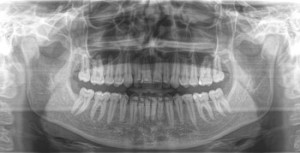While the number of Americans suffering from Osteoporosis continues to soar, the number of individuals at risk for bone fractures and bone loss also increases. In turn, the use of anti-resorptive medications is also on the rise, as doctors attempt to help strengthen bones and prevent further bone deterioration in those at risk. Whether these medications are taken orally or by injection (as a form of cancer therapy), it’s important that patients understand the effects of anti-resorptive prescriptions on their oral health. Though a rare condition, Osteonecrosis of the jaw (ONJ) is connected to the use of re-sorptive medications, and can result in tremendous damage to the jawbone. While individuals are more likely to develop Osteonecrosis as a result of high dosages infused during cancer treatment, there are a small percentage of individuals that will develop ONJ as a result of commonly prescribed re-sorptive medications.
As its name indicates, Osteo (bone) and necrosis (death) occurs when part of the jawbone is exposed and ultimately dies from lack of blood supply. Though ONJ can occur following a routine tooth extraction, it is also connected to infection, steroid use, radiation treatments, or a high dosage of anti-resorptive medications.
Determining whether one is at risk for developing ONJ depends somewhat on what type of medication they are receiving, how they are receiving it, and why they are receiving it. For instance, cancer patients may have a higher risk of ONJ if they are administered treatment through an IV. In turn, ONJ is notably related to breast cancer and multiple myeloma cancer types.
Prevention
With many implications for oral health, Osteonecrosis of the jaw is difficult to classify and even more difficult to understand–especially for patients. Thus, dental professionals emphasize the importance of committing to an oral health routine as a powerful way to prevent the onset of ONJ. In addition, patients should always discuss all medications and treatments they are receiving with their dentists in order to develop the greatest defense against the possibility of ONJ.
At Grateful Dental, patients appreciate the expertise of Dr. Leia Porcaro. When it comes to prescribed medications and treatments, Dr. Porcaro understands that these factors play a role in a patient’s oral health. Therefore, if you are beginning a new medication for Osteoporosis or if you are scheduled to begin cancer treatment, call the team at Grateful Dental today.














